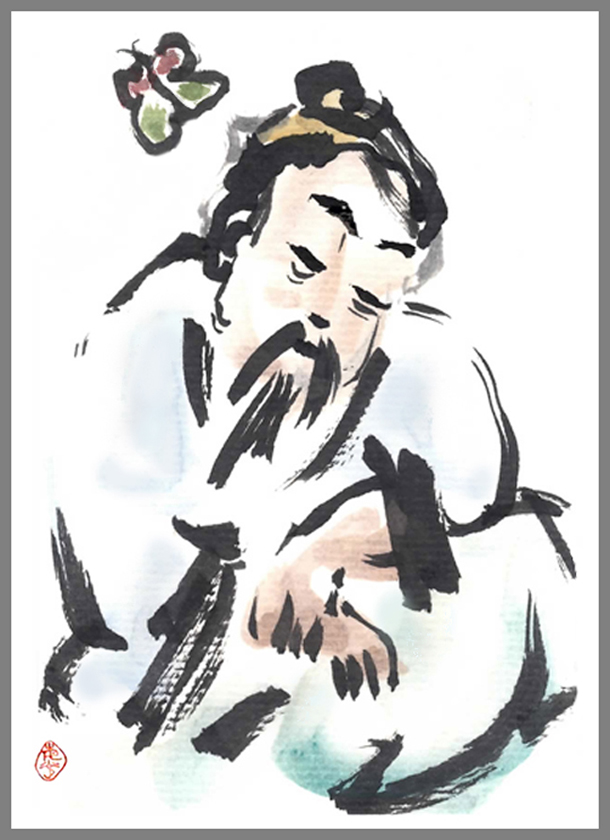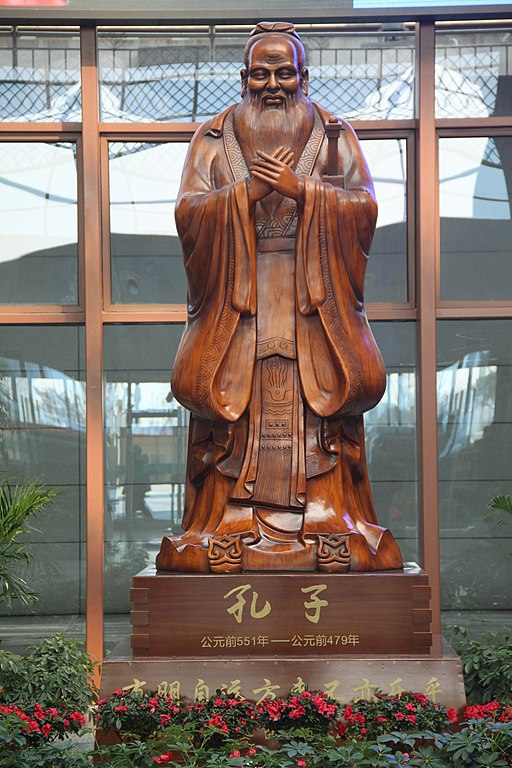
“Unify your attention. Rather than listen with the ear, listen with the heart. Rather than listen with the heart, listen with the energies. Listening stops at the ear, the heart as what tallies with the thought. As for ‘energy’, it is the tenuous which waits to be roused by other things. Only the Way accumulates the tenuous. The attenuating is the fasting of the heart” (Chuang-tzu).
Chuang-tzu’s oft-quoted text on the “Fasting of the Heart” is the first part of Chapter 4, titled “Worldly business among men,” followed by a second story on a useless tree. Both are told as issues faced by men in offices, with the Fasting of the Heart meant as a guidance for those who attempt to bring about change in a state suffering from the misrule of its ruler, and the second showing how to make oneself useless, unemployable, so that the government leaves you alone.
What not to do when one wants to effect change
Yen Hui, the favourite disciple of Confucius, has made up his mind to go to the King full of good intentions and hoping to be able to help the state of Wey ravaged with war due to the misrule of a young and careless lord. He comes to take leave of his master, and receives full guidance about the do’s and dont’s of such a risky undertaking.
“Yen Hui called on Confucius and asked leave to travel.” Asked for his reason, he replies: “I hear that the lord of Wey is young in years and wilful in deeds. He is careless of the cost to his state and blind to his own faults; he is so careless of the cost in men’s lives that the dead fill the state to its borders as though it had been ravaged with fire and slaughter … I have heard you say, sir: “Never mind the well ruled states, go to the misruled states … I wish to think out what to do in the light of what you taught me, in the hope that the state may be restored to health.”
To which Confucius replies: “I am afraid that you are simply going to your execution. One doesn’t want the Way to turn into a lot of odds and ends. If it does it becomes multiple, when it’s multiple it gets you muddled, when you’re muddled you worry, and once you worry there’s no hope for you. The utmost man of old established in other people only what he had first established in himself. Until it is firmly established in yourself, what time have you to spare for the doings of tyrants?
“Besides, do you after all understand that the thing by which the Power in us is dissipated is the very thing by which knowledge is brought forth? The Power is dissipated by making a name, knowledge comes forth from competition. To ‘make a name’ is to clash with others, ‘knowledge’ is a tool in competition. Both of them are sinister tools, of no use in perfecting conduct.
“Then again, to be ample in Power and solid in sincerity but lack insight into others’ temperaments, not enter into competition for reputation but lack insight into others’ hearts, yet insist in the presence of the tyrant on preaching about Goodwill and Duty and the lines laid down for us, this amounts to taking advantage of someone’s ugliness to make yourself handsome. The name for it is ‘making a pest of oneself’. Make a pest of oneself, and others will certainly make pests of themselves in return. I rather fancy that someone is going to be a pest to you.
“Another thing: if you do think he favours clever people and dislikes fools, will it do you any good to try to be especially clever? Better not get into an argument. A king or duke is sure to pit his wits against one’s own with the whole weight of his authority behind him. Your eye he’ll dazzle, your look he’ll cow, your mouth he’ll manage, your gesture he’ll shape, your heart he’ll form.”
“You will find yourself using fire to quell fire, water to quell water, the name for it is ‘going from bad to worse’. Being submissive at the start that is you will always be. I am afraid that he will lose faith in your fulsome words, and so you’ll be sure to die at the tyrant’s hands.
“One more point. Formerly Kuan Lung-feng was executed by Chieh and Prince Pi-kan by Chow. Both were men meticulous in their personal conduct who as ministers offended emperors by sympathising with their subjects. Consequently their lords found their meticulousness a reason to get rid of them. These were men who desired a good name. And formerly Yao attacked Tsung, Chih and Hsü-ao, Yü attacked Yu-hu, the countries were reduced to empty wastes and hungry ghosts, the rulers were executed. There was no end to their calls to arms, no respite in their aspiration to gread deeds. All these men were seekers of the name or the deed, and don’t tell me you haven’t heard of them! A good name, a gread deed, tempt even the sage, and do you think you’re any better?
“However, I am sure you have something in mind. Let me hear about it.
‘Would it do’, said Hui, ‘to be punctilious and impartial, diligent and single-minded?’
“O no, that’s no good at all! To sustain the Yang at its height without reverting to the Yin puts one under great stress, the tension shows in one’s face. It is something wich ordinary people prefer not to defy, so they suppress what the other man is stirring up in them in order to calm their own hearts. Even what are named ‘powers which progress from day to day’ will not grow in him, let alone the supreme Power! He will stay obstinately as he is and refuse to reform, outwardly agreeing with you but inwardly insensible, and what’s the good of that?
“In that case, said Hui, inwardly I shall be straight but outwardly I shall bend, I shall mature my own judgement yet conform to my betters. In being ‘inwardly straight’, I shall be of Heaven’s party. One who is of Heaven’s party knows that in the eyes of Heaven he is just as much a son as the Son of Heaven is, and is the only one who, when speaking on his own account, has an urge which carries him away and other people applaud, or which carries him away and other people disapprove? Such a one is excused by others as childlike. It is what I mean by ‘being of Heaven’s party’.
“In ‘outwardly bending’, I shall be of man’s party. Lifting the tablet in his hands and kneeling and bowing from the waist are the etiquette of a minister, everyone else does it, why would I presume to be an exception? If you do what others do, the others for their part will find no fault in you. It is this that I mean by ‘being of man’s party’.
“‘In maturing my own judgement yet conforming to my betters’ I shall be of the party of the men of old. The words, although in substance instructions or criticisms, belong to the men of old, I can’t be held responsible for them. Such a person can be as straight as he likes without getting into trouble. It is what I mean by ‘being of the party of the men of old. How will that do?
“Oh no, that’s no good at all! Too much organising. If you stick to the forms and don’t get too familiar, even if you’re stupid you will escape blame. But that’s all that can be said for it. How would you succeed in making a new man of him? It’s still taking the heart as one’s authority’.
“‘I have nothing more to propose’, said Hui. ‘I venture to ask the secret of it’.
“‘Fast, and I will tell you’, said Confucius. ‘Doing something thought out in the heart, isn’t that too easy? Whoever does things too easily is unfit for the lucid light of Heaven’.
“‘I am of a poor family, I have not drunk wine or eaten a seasoned disth for months. Would that count as fasting?’
“‘That kind of fasting one does before a sacrifice, it is not the fasting of the heart’.
“I venture to inquire about the fasting of the heart.”
In the end, Confucius’s advice could only go so far. What Hui must do is fast, not just do a food fast, but practice the fasting of the heart. Remember that for Chuang-tzu, the heart is the organ of thought. The dialogue here reaches a turning point, as it is clear that the fasting of the heart is a practice that is valid for all practitioners of the Way, not just those hoping to change the behaviour of a bad ruler.
“‘I venture to inquire about the fasting of the heart’.”
“‘Unify your attention. Rather than listen with the ear, listen with the heart. Rather than listen with the heart, listen with the energies. Listening stops at the ear, the heart as what tallies with the thought. As for ‘energy’, it is the tenuous which waits to be roused by other things. Only the Way accumulates the tenuous. The attenuating is the fasting of the heart’.
“When Hui has never succeeded in being the agent, a deed derives from Hui. When he does succeed in being its agent, there has never begun to be a Hui. – Would that be what you call attenuating?
“Perfect! I shall tell you. You are capable of entering and roaming free inside his cage, but do not be excited that you are making a name for yourself. When the words penetrate, sing your native note; when they fail to penetrate, desist. When there are no doors for you, no outlets, and treating all abodes as one you find your lodgings in whichever is the inevitable, you will be nearly there.
“To leave off making footprints is easy, never to walk on the ground is hard. What has man for agent is easily falsified, what has Heaven for agent is hard to falsify. You have heard of using wings to fly. You have not yet heard of flying by being wingless; you have heard of using the wits to know, you have not yet heard of using ignorance to know.
“Look up the easier of our toils. In the empty room the brightness grows. The blessed, the auspicious, stills the stilled. The about to be does not stay still.
“This I call ‘going at a gallop while you sit’. If the channels inward through eyes and ears are cleared, and you expel knowledge from the heart, the ghostly and daemonic will come to dwell in you, not to mention all that is human! This is to transform with the myriad things, here Shun and Yü found the knot where all threads join, here Fu-hsi and Chi Chi’ü finished their journey, not to speak of lesser men!’
Victor Mair’s translation of the last paragraphs of the text
The last paragraphs of Graham’s translation, which is very close to the Chinese original, may be more challenging to some readers. So the following is Victor Mair’s translation of the same text. You will note that Mair is talking of the fasting of the mind, since, for the West, the organ of thought is the mind.
“‘Maintaining the unity of your will’, said Confucius, ‘listen not with your ears but with your mind. Listen not with your mind but with your breath. The ears are limited to listening, the mind is limited to tallying. The primal breath, however, awaits things emptily. It is only through the Way that one can gather emptiness, and emptiness is the fasting of the mind’.”
“‘Before I am able to exercise fasting of the mind,’ said Yen Hui, ‘I truly have an identity. But after I am able to exercise it, I will no longer have an identity. Can this be called emptiness?’”
“‘Precisely,’ said Confucius, ‘Now I shall explain it for you. You may enter his realm as a wandering persuader, but don’t be attracted by fame. If he accepts you, present your views; if he rejects you, cease. When there is neither gate nor opening, if you can dwell in unity and lodge in necessity, you’re close to it’.”
“To eliminate one’s footsteps by not walking is easy, but to walk without touching the ground is hard. If you are impelled by human feelings, it is easy to be false; if you are impelled by nature, it is hard to be false. I’ve only heard of creatures that fly with wings, never of creatures that fly with nonwings. I’ve only heard of people knowing things through awareness, never of people knowing things through unawareness. Observe the void – the empty room emits a pure light. Good fortune lies in stopping when it is time to stop. If you do not stop, this is called ‘galloping while sitting’. Let your senses communicate within and rid yourself of the machinations of the mind. Then even ghosts and spirits will take schelter with you, not to mention men. This is how the myriad things are transformed. It is that to which Yao and Shun bound themselves, and that which Fuhsi and Chich’ü exercised all their lives. All the more is it suited for the masses.”
In a western context, guidance for an undertaking such as that of Hui would have focused on remarks of a political nature, borrowed from diplomacy, with psychological insights into the mindset of a ruler, especially a thoughtless, careless, self-centred one such as the lord of Wey. Here, however, right from the start, Confucius talks about the “Power,” meaning the ch’i (translated as energies), the need to connect to the natural energies of the cosmos, and therefore to prepare oneself ahead of time. The risk of falling into the temptation of trying to gain fame is not seen as a mere psychological hindrance arising from competition, it is an obstacle to the proper working of the energies of the cosmos, just as, Confucius says, knowledge is: “The Power is dissipated by making a name, knowledge comes forth from competition. To ‘make a name’ is to clash with others, ‘knowledge’ is a tool in competition. Both of them are sinister tools, of no use in perfecting conduct.”
Graham explains: “[Hui] must trust the ch’i, the breath and other energising fluids which alternate between activity as the Yang and passivity as the Yin (as in breathing out and in), training them with the meditative technique including controlled breathing. When the purified fluid has become perfectly tenuous the heart will be emptied of conceptual knowledge, the channels of the senses will be cleared, and he will simply perceive and respond. Then the self dissolves, energies strange to him and higher than his own (the “daemonic”) enter from outside, the agent of his actions is no longer the man but Heaven working through him, yet paradoxically (and it is in hitting on this paradox that Hui convinces Confucius that he understands) in discovering a deeper self he becomes for the first time truly the agent. He no longer has deliberate goals, the ‘about to be’ at the centre of him belongs to the transforming processes of heaven and earth. Then he will have the instinct for when to speak and when to be silent, and will say the right thing as naturally as a bird sings.”
Sources:
A C Graham – Chuang-Tzu, The Inner Chapters
Victor Mair – Wandering on the Way – Early Taoist Tales and Parables of Chuang Tzu

